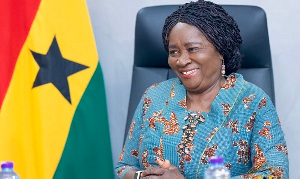(From Hannah Asomaning, GNA Special Correspondent, Pittsburg, USA)
Pittsburg (USA), July 12, GNA - Communities within the Oil drilling catchment areas should benefit most from Ghana's Oil find, Mrs Sheila Ashong, Programme Officer at the Environmental Protection Agency (EPA) has said. She said: "The people own the resource; therefore they should be involved in every level of decision making with regards to the oil find."
Mrs Ashong is part of a group of 22 environmental professionals currently in the United States of America to participate in an exchange programme between the University of Ghana and the Duquesne University on the Extractive Industry and its attendant environmental challenges. The group made up of people from the Ministry of Environment, Science and Technology (MEST), people from the Academia, Geologists, students, Journalists and officials of the Ghana National Petroleum Company (GNPC) have so far visited coal and gas mining sites to have first-hand experience about the operations of the extractive industries in USA.
Mrs Ashong said: "I was hoping to learn best practices from the United States. However, I have rather had the opportunity to learn from the mistakes of the United States, I have seen everything that Ghana should not do."
She advised that Ghanaians must learn to appreciate how things are managed environmentally in the country, since some components of Ghana's Environmental Impact Assessment procedures are good, but added that there was more room for improvement. Mrs Ashong, however, advised Ghanaians especially those living around the oil catchment area, not to expect manna from heaven because Ghana has found oil and urged them to be willing to adjust and compromise with government to manage the oil effectively. Dr Francis K. Ewusie Nunoo, Head of the Department of Oceanography and Fisheries and leader of the group, stressed the need for government to take environmental and social concerns of the oil find seriously, since activities in the extractive industries could have far-reaching effects on the entire society.
"I will incorporate what we have learnt here in my lectures, research, and advocacy to enable my students to be more useful in the management of Ghana's oil find," he said. Dr Raymond Babanawo, Project Technical Assistant of the Ghana Environmental Conventions Authority of the MEST, said the need to have the right financial framework and make good use of the oil money was paramount to the success of good environmental management. Mr Vincent Hotor, Geologist at GNPC, said the lessons he had learnt so far in the United States were very useful, revealing that Ghana had a large onshore sedimentary basin called the Voltarian Basin and said similar environmental challenges were likely to occur. Mrs Victoria Elorm Frempong, Lecturer at the Department of Mineral Engineering at the University of Mines and Technology in Tarkwa, said: "I will start educating my students from the classroom to enable them to know the environmental impact on mining activities and go a step beyond the classroom to educate the general public through research and publications.
Mrs Frempong urged the government not to depend totally on developed countries for advice since they face same environmental problems that prevail in the developing countries. Emphasizing the need for government to involve all Ghanaians in the management of the country's oil, she said: "the oil is for every Ghanaian and everybody should be involved." The programme dubbed: Emerging Leaders in Environment and Extraction Programme, recommended that government should have clear cut policies that take on board the needs of all stakeholders on oil extraction and management 12 July 10
General News of Monday, 12 July 2010
Source: GNA












